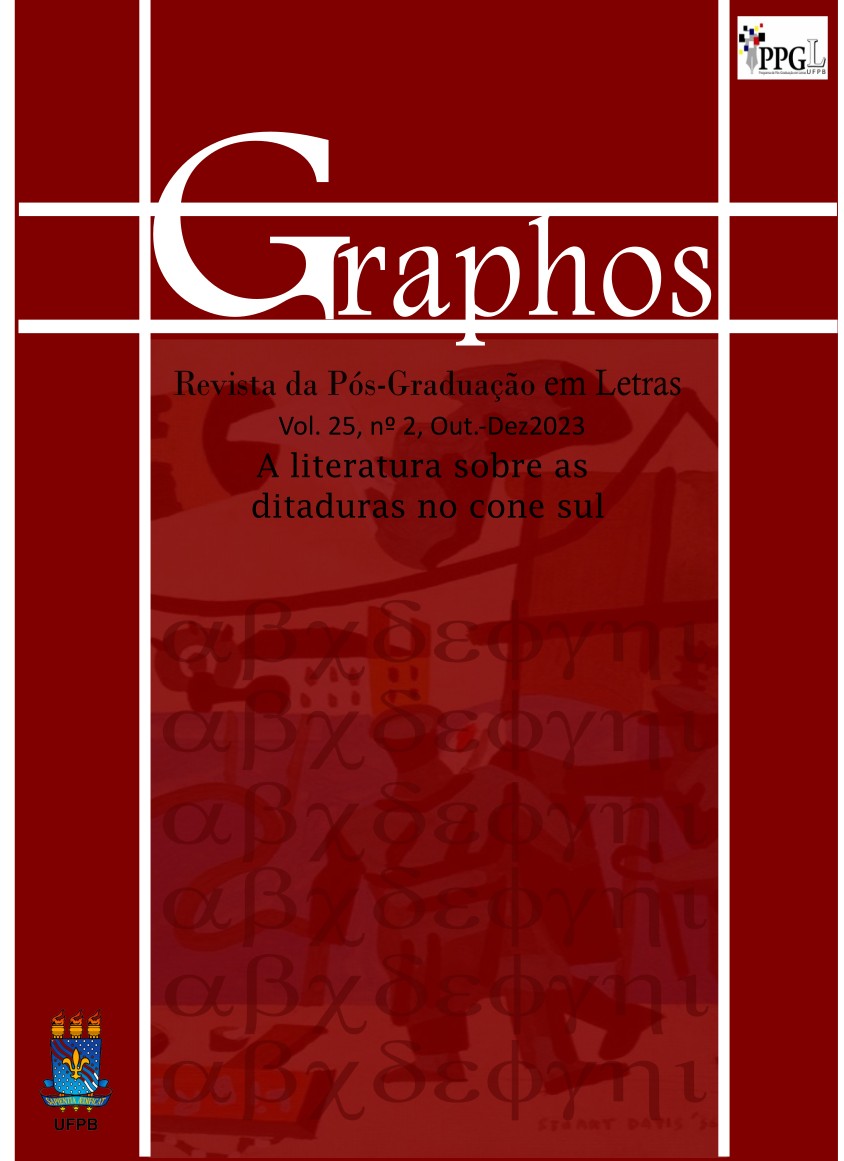GUILHERME MANDARO'S POETICS IN THE CONTEXT OF THE MILITARY DICTATORSHIP
DOI:
https://doi.org/10.22478/ufpb.1516-1536.2023v25n2.66231Keywords:
Mimeograph Generation; Military Dictatorship; Guilherme Mandaro; Counterculture; Marginal Poetry of Rio de Janeiro.Abstract
This paper aims to analyze the work of Guilherme Mandaro (1952-1979) in its aesthetic and political aspects in the context of the military dictatorship. Starting from the mimeograph and its reverberations in the memory and literature of a generation, we initially analyze the context in which the so-called marginal literary generation took place and, later, we present the author, considered one of the main precursors of this production in the 1970s. The term "marginal" within poetry is related in this perspective not to a determined marginalized social class, but in direct relation to the means of literary production used and its conception situated at the margins of the canons. Thus, it broadened the paths of art in general, decentralizing it from old paradigms, fruit of the period of immense atomism experienced at the end of the 1960s. The qualitative, bibliographical research takes place through the traces left by the poet in his brief, intense existence, scrutinized through his participation in the collective "Nuvem Cigana" (1972-1980) and in the poetic works Hotel de Deus (1976) and Trem da noite (1979). His poetics comes from urban echoes originating from Brazilian Modernism, North American counterculture, rock, and Rio de Janeiro street carnival, among myriad possibilities arising from the experiences of this generation. The poet unveils the marginal literary movement against the official canons of literature, the ways of opposing the military dictatorship and, in a broad perspective, joins the countercultural youth of the West, using poetry as an artifact of contestation of the capitalist and technocratic system.
Downloads
References
ANDRADE, Oswald de. Obras Completas VII. Poesias Reunidas. Rio de Janeiro: Civilização Brasileira, 1974.
ARAÚJO, André Luís de. Poética brasileña contemporánea: de la poesía marginal hacia la poesía divergente. Caligrama, Belo Horizonte, v. 23, n. 1, p. 5-20, 2018. DOI: https://doi.org/10.17851/2238-3824.23.1.5-20
BARROS, Patrícia; ROST, Isis (org.). Transas da contracultura brasileira. São Luís: Passagens, 2020. DOI: https://doi.org/10.29327/518768
BARROS, Patrícia Marcondes de; GODOY, Maria Carolina; GUERRA, Paula. “Visões à margem e além mar”: A Literatura Marginal Brasileira na perspectiva de Heloísa Buarque de Hollanda e de Francisco Topa. Travessias, Cascavel, v. 14, n. 2, p. 7-14, maio/ago.2020. DOI: https://doi.org/10.48075/rt.v14i2.25503
BERMAN, Marshall. Tudo que é sólido desmancha no ar: a aventura da modernidade. Companhia das Letras, São Paulo, 1992.
BOSI, Viviana. Poesia em risco: Itinerários para aportar nos anos 1970 e além. São Paulo, Editora 34, 2021.
BRAGA, Regina Estela. Imprensa Alternativa: apogeu, queda e novos caminhos. Prefeitura da cidade do Rio de Janeiro. Cadernos da Comunicação: série Memória, 2005.
BRITO, Antônio Carlos de (Cacaso). Não quero prosa. Campinas: Editora da Unicamp; Rio de Janeiro: Editora da UFRJ, 1997.
GALILEU. Como o mimeógrafo influenciou movimentos culturais. 2016. Disponível em: https://revistagalileu.globo.com/Caminhos-para-o-futuro/Desenvolvimento/noticia/2016/08/ha-140-anos-thomas-edison-recebia-patente-do-mimeografo.html Acesso em: 04/05/2023.
CABAÑAS, Teresa. A poesia marginal brasileira uma experiência da diferença. Artifara. Revista de lenguas y literaturas ibéricas y latino-americanas. Dipartimento di Scienze Letterarie e Filologiche, n. 5, 2005.
GAY, Peter. Modernismo, o fascínio da heresia: de Baudelaire a Beckett e mais um pouco. São Paulo: Companhia das Letras, 2009.
GOFFMAN, Ken; JOY, Dan. Contracultura através dos tempos. Rio de Janeiro: Ediouro, 2007.
GONÇALVES, Daniel José. O desbunde como manifestação política: a identidade de gênero na obra de Ana Cristina Cesar. Dissertação (mestrado) – Universidade Federal do Paraná, Setor de Ciências Humanas, Letras e Artes, Programa de Pós-Graduação em Letras. Defesa: Curitiba, 24 set. 2008.
HOLLANDA, Heloísa Buarque. 26 poetas hoje. Rio de Janeiro: Editora Labor, 1975.
HOLLANDA, Heloísa Buarque. Impressões de viagem: CPC, vanguarda e desbunde, 1960/1970. Rio de Janeiro: Rocco, 1980.
MANDARO, Guilherme. Hotel de Deus. Rio de Janeiro: Nuvem Cigana, 1976.
MANDARO, Guilherme. Trem da noite. Rio de Janeiro: Nuvem Cigana, 1979.
MEDEIROS, Fernanda Teixeira de. Artimanhas e poesia: o alegre saber da Nuvem Cigana. Gragoatá, Niterói, n. 12, p. 113-128, 1. sem. 2002.
OLIVEIRA, Rejane Pivetta de. Literatura marginal: questionamentos à teoria literária. Ipotesi, Juiz de Fora, v.15, n.2 - Especial, p. 31-39, jul./dez. 2011.
OLIVEIRA, Leonardo Davino de. Jeito de corpo: desbunde como resistência político-poética. Anais do XV Encontro ABRALIC. Rio de Janeiro, 19 a 23 de setembro de 2016, UERJ, Rio de Janeiro.
PEÇANHA, Dóris Lieth Nunes. Movimento beat - rebeldia de uma geração. Rio de Janeiro, Editora Vozes, 1988.
VELOSO, Caetano. Verdade tropical. São Paulo: Companhia das letras, 1997.
Downloads
Published
Issue
Section
License
Copyright (c) 2023 Patrícia Marcondes de Barros, Marcelo Fernando de Lima

This work is licensed under a Creative Commons Attribution 4.0 International License.







